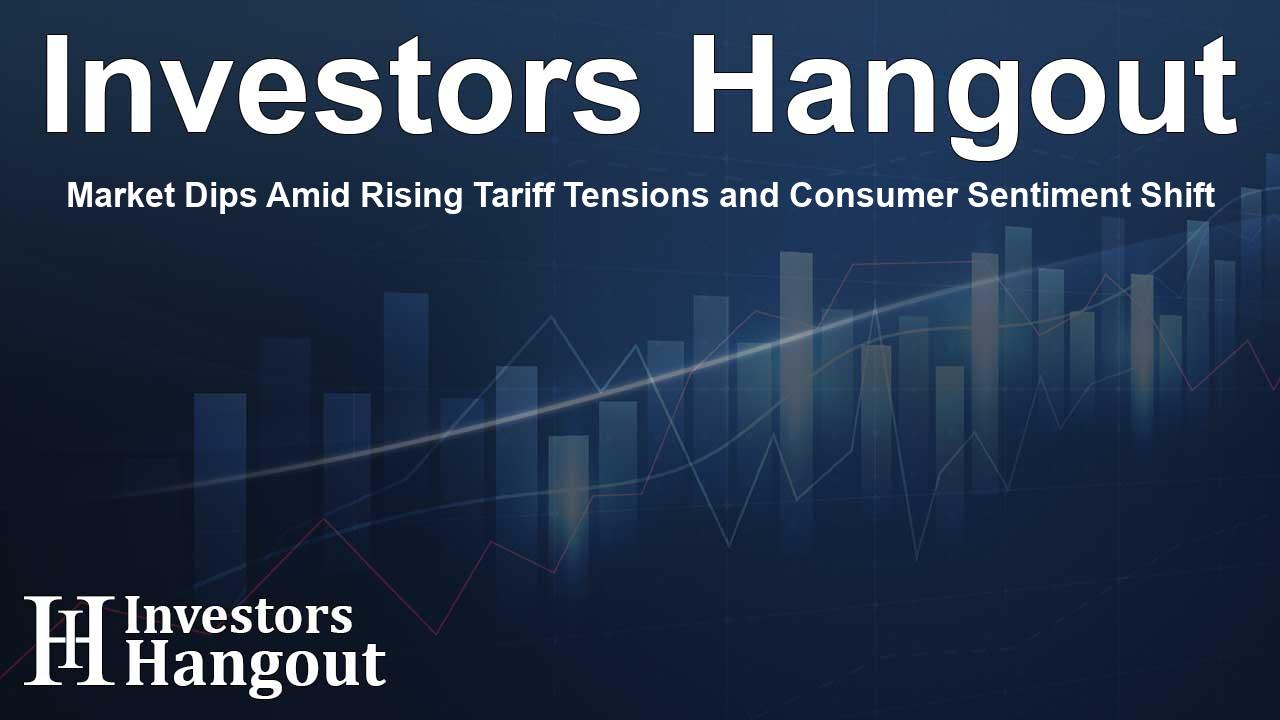Market Dips Amid Rising Tariff Tensions and Consumer Sentiment Shift

Stock Market Reacts to Tariff Concerns
In a notable market shift, investors experienced significant anxiety as U.S. stocks fell dramatically. The Nasdaq Composite saw a steep decline, closing down over 800 points in response to tariff threats directed at China.
Fear Grips Investors
The CNN Money Fear and Greed Index reported a transition into the "Fear" zone, a clear indication of declining market sentiment. This shift reflects the growing unease among investors about potential trade conflicts and its implications on economic stability.
Major Indices Decline
Last week proved challenging for major indices, with the S&P 500 dropping 2.4% and the Dow Jones Industrial Average experiencing a decline of 2.7%. The overarching sentiment among traders suggested a readiness to reassess their positions as volatility increased.
Economic Indicators Shift
On the economic data front, consumer sentiment took a dip, with reports indicating a drop from 55.1 in September to 55 in October, which reflected lower confidence than market expectations. Such numbers raise eyebrows regarding spending habits moving forward.
Sector Performance Variances
While most sectors experienced losses, technology stocks notably struggled, particularly Advanced Micro Devices Inc. (NASDAQ: AMD), which fell 7.8%. This decline came on the heels of what was previously one of its best performing weeks since 2016.
Mixed Results Across the Board
The Dow closed about 879 points lower, settling at 45,479.60, while the S&P 500 ended down at 6,552.51. The Nasdaq Composite likewise remained under pressure, finishing at 22,204.43. These movements signify a broader concern about market trends.
Anticipation for Upcoming Earnings Reports
Amid the turbulence, investors are keenly awaiting earnings results from Fastenal Co. (NASDAQ: FAST) and Rocky Mountain Chocolate Factory Inc. (NASDAQ: RMCF). As market participants look for insights into the coming periods, these reports could prove pivotal.
The Fear & Greed Index Explained
The CNN Business Fear and Greed Index serves as a barometer of investor sentiment, measuring the balance between fear and greed in the market. With a current reading of 29.5, the index indicates significant fear, contrasting sharply with its previous measurement of 46.6.
Understanding Market Sentiment
Market sentiment is crucial as it influences stock prices. In periods of heightened fear, investors may retreat, causing stock prices to drop. Conversely, when greed prevails, stock prices may rise, leading to positive market activity.
Conclusion
The current economic climate, underscored by tariff threats and shifting consumer sentiment, poses challenges for investors. With eyes on upcoming earnings reports and continuous monitoring of the Fear and Greed Index, market stakeholders are navigating a period filled with uncertainty.
Frequently Asked Questions
What triggered the recent dip in the stock market?
The stock market dip was primarily triggered by President Trump's threats to increase tariffs on Chinese imports, causing investor anxiety.
How has the Fear and Greed Index changed recently?
The Fear and Greed Index moved into the "Fear" zone with a reading of 29.5, down from a previous reading of 46.6.
What sectors were most affected by the market dip?
Sectors that experienced the most significant losses included technology, consumer discretionary, and energy stocks.
Which companies are investors watching for earnings results?
Investors are closely watching Fastenal Co. (NASDAQ: FAST) and Rocky Mountain Chocolate Factory Inc. (NASDAQ: RMCF) for their earnings results.
What does a lower consumer sentiment indicate?
A lower consumer sentiment, dropping to 55 from 55.1, suggests that consumers may be less confident in the economy, potentially affecting spending behavior.
About The Author
Contact Kelly Martin privately here. Or send an email with ATTN: Kelly Martin as the subject to contact@investorshangout.com.
About Investors Hangout
Investors Hangout is a leading online stock forum for financial discussion and learning, offering a wide range of free tools and resources. It draws in traders of all levels, who exchange market knowledge, investigate trading tactics, and keep an eye on industry developments in real time. Featuring financial articles, stock message boards, quotes, charts, company profiles, and live news updates. Through cooperative learning and a wealth of informational resources, it helps users from novices creating their first portfolios to experts honing their techniques. Join Investors Hangout today: https://investorshangout.com/
The content of this article is based on factual, publicly available information and does not represent legal, financial, or investment advice. Investors Hangout does not offer financial advice, and the author is not a licensed financial advisor. Consult a qualified advisor before making any financial or investment decisions based on this article. This article should not be considered advice to purchase, sell, or hold any securities or other investments. If any of the material provided here is inaccurate, please contact us for corrections.
